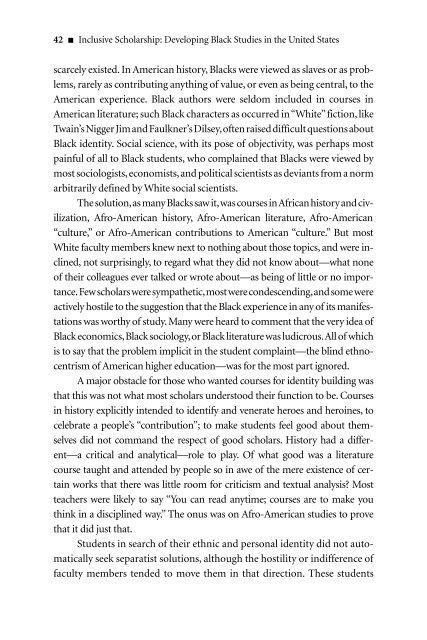Inclusive Scholarship: Developing Black Studies - Ford Foundation
Inclusive Scholarship: Developing Black Studies - Ford Foundation
Inclusive Scholarship: Developing Black Studies - Ford Foundation
Create successful ePaper yourself
Turn your PDF publications into a flip-book with our unique Google optimized e-Paper software.
42 <strong>Inclusive</strong> <strong>Scholarship</strong>: <strong>Developing</strong> <strong>Black</strong> <strong>Studies</strong> in the United States<br />
scarcely existed. In American history, <strong>Black</strong>s were viewed as slaves or as problems,<br />
rarely as contributing anything of value, or even as being central, to the<br />
American experience. <strong>Black</strong> authors were seldom included in courses in<br />
American literature; such <strong>Black</strong> characters as occurred in“White”fiction, like<br />
Twain’sNiggerJimandFaulkner’sDilsey,oftenraiseddifficultquestionsabout<br />
<strong>Black</strong> identity. Social science, with its pose of objectivity, was perhaps most<br />
painful of all to <strong>Black</strong> students, who complained that <strong>Black</strong>s were viewed by<br />
most sociologists,economists,and political scientists as deviants from a norm<br />
arbitrarily defined by White social scientists.<br />
Thesolution,asmany<strong>Black</strong>ssawit,wascoursesinAfricanhistoryandcivilization,<br />
Afro-American history, Afro-American literature, Afro-American<br />
“culture,” or Afro-American contributions to American “culture.” But most<br />
White faculty members knew next to nothing about those topics, and were inclined,<br />
not surprisingly, to regard what they did not know about—what none<br />
of their colleagues ever talked or wrote about—as being of little or no importance.Fewscholarsweresympathetic,mostwerecondescending,andsomewere<br />
actively hostile to the suggestion that the <strong>Black</strong> experience in any of its manifestations<br />
was worthy of study. Many were heard to comment that the very idea of<br />
<strong>Black</strong> economics,<strong>Black</strong> sociology,or <strong>Black</strong> literature was ludicrous.All of which<br />
is to say that the problem implicit in the student complaint—the blind ethnocentrism<br />
of American higher education—was for the most part ignored.<br />
A major obstacle for those who wanted courses for identity building was<br />
that this was not what most scholars understood their function to be. Courses<br />
in history explicitly intended to identify and venerate heroes and heroines, to<br />
celebrate a people’s “contribution”; to make students feel good about themselves<br />
did not command the respect of good scholars. History had a different—a<br />
critical and analytical—role to play. Of what good was a literature<br />
course taught and attended by people so in awe of the mere existence of certain<br />
works that there was little room for criticism and textual analysis? Most<br />
teachers were likely to say “You can read anytime; courses are to make you<br />
think in a disciplined way.” The onus was on Afro-American studies to prove<br />
that it did just that.<br />
Students in search of their ethnic and personal identity did not automatically<br />
seek separatist solutions, although the hostility or indifference of<br />
faculty members tended to move them in that direction. These students

















